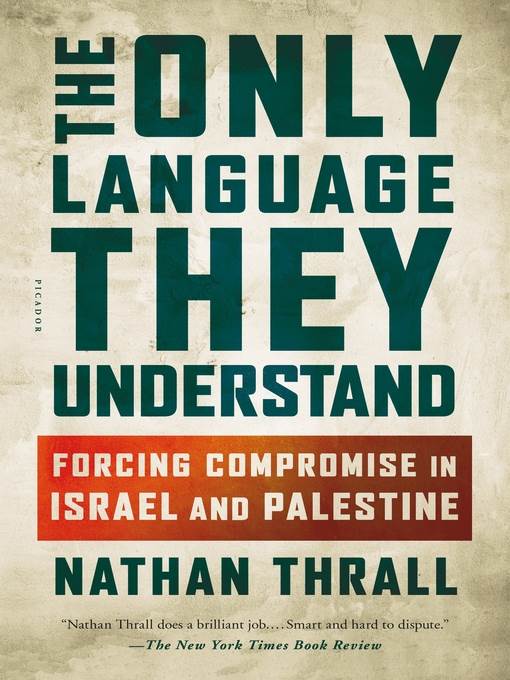
The Only Language They Understand
Forcing Compromise in Israel and Palestine
- اطلاعات
- نقد و بررسی
- دیدگاه کاربران
نقد و بررسی

April 1, 2017
An assiduous assault on the management of the apparently defunct peace process that has eluded Israel and Palestine.With this earnest addition to the expanding shelf of commentary on the seemingly irresoluble Arab-Israeli conflict, journalist Thrall, a senior analyst with the International Crisis Group, offers, under the rubric of "Forcing Compromise" (the first third of the book), a detailed history of failed efforts to reach accord in the Holy Land. The problem is more than settlements, recognition of the State of Israel, the eventual status of Jerusalem, or even the number of casualties. It is well-earned distrust on both sides. Writing mostly of Israeli activities and American reactions, Thrall reviews the failures of Camp David, the Wye River meetings, and the Oslo agreements. Menachem Begin, Yitzhak Rabin, and Benjamin Netanyahu were and are wrong; ditto negotiators Marin Indyk, Dennis Ross, and John Kerry. So, too, in various ways, were many American presidents who were, in the author's view, too easy on the Israelis. Thrall proposes increased American and European pressure on the parties without elaborating on what the pressure would be or how it would work. Meanwhile, Arabs and Israelis accept the status quo as their best alternative. The remainder of the book consists of reprints of reviews and essays published elsewhere. The author provides copious footnotes (with many secondary sources cited), and he frequently mentions "Mandatory Palestine" in comparison to the Jewish state. The looming Arab nations in the neighborhood and the Arab League's support of Hamas (which runs Gaza and whose goal is still destruction of "the Zionist entity") are not recognized as threats to peace. Certainly, each party faces legitimate, fundamental problems: rockets, suicide bombers, checkpoints, land grabs, and internecine conflicts. However, as earnest as he is in illuminating the problems, Thrall remains partial and selective in probing them. A troubling and truculent history of the still-stalemated search for peace in the Middle East.
COPYRIGHT(2017) Kirkus Reviews, ALL RIGHTS RESERVED.

October 1, 2016
Jerusalem-based Thrall, a former staff member of the New York Review of Books now with the International Crisis Group, considers decades of failed efforts at making peace between Israelis and Palestinians and argues that diplomacy has simply not worked. Change has come not through negotiation and state-building but upheaval, from boycotts and civil disobedience to outsider-imposed resolutions and, alas, violence. Where does that leave us?
Copyright 2016 Library Journal, LLC Used with permission.

Starred review from May 1, 2017
Thrall, an experienced journalist and commentator on the Middle East, has linked together and updated substantial analyses on various aspects of the Palestinian-Israeli conflict to explain the lack of progress in spite of 40 years of close attention by American presidents. In 1977-78, President Jimmy Carter guided important agreements on a foundation for peace. Since then, Israel was able to reduce the threats from external Arab armies through negotiations, and responded to the Palestine uprisings by convincing Palestinians to accept limited elements of self-rule and by expanding settlements and claiming new land in the West Bank and Jerusalem. Thrall concludes that Israel has never really acknowledged the validity of Palestinian history or demand for sovereignty. He notes ironically that President Barack Obama entered office in 2009 with empathy for Palestinian claims but failed to produce any improvements for them. VERDICT Highly recommended for readers familiar with the headlines on this issue who want a deeper and more detailed understanding. [See Prepub Alert, 9/12/16.]--Elizabeth Hayford, formerly with Associated Coll. of the Midwest, Evanston, IL
Copyright 2017 Library Journal, LLC Used with permission.

May 1, 2017
Thrall, an experienced journalist and commentator on the Middle East, has linked together and updated substantial analyses on various aspects of the Palestinian-Israeli conflict to explain the lack of progress in spite of 40 years of close attention by American presidents. In 1977-78, President Jimmy Carter guided important agreements on a foundation for peace. Since then, Israel was able to reduce the threats from external Arab armies through negotiations, and responded to the Palestine uprisings by convincing Palestinians to accept limited elements of self-rule and by expanding settlements and claiming new land in the West Bank and Jerusalem. Thrall concludes that Israel has never really acknowledged the validity of Palestinian history or demand for sovereignty. He notes ironically that President Barack Obama entered office in 2009 with empathy for Palestinian claims but failed to produce any improvements for them. VERDICT Highly recommended for readers familiar with the headlines on this issue who want a deeper and more detailed understanding. [See Prepub Alert, 9/12/16.]--Elizabeth Hayford, formerly with Associated Coll. of the Midwest, Evanston, IL
Copyright 2017 Library Journal, LLC Used with permission.




دیدگاه کاربران